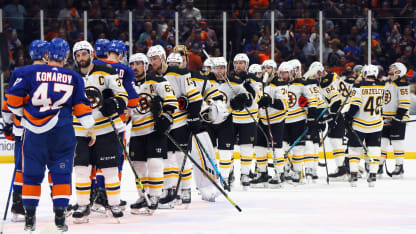Defensemen injuries:The Bruins lost two key defensemen to injuries during the Stanley Cup Playoffs, starting with Miller in Game 5 of the Stanley Cup First Round against the Washington Capitals. Although coach Bruce Cassidy said there was a possibility that Miller could have come back had Boston pushed New York to Game 7, he missed the entire series against the Islanders and the Bruins missed his presence. They also were without Carlo for the final three games against the Islanders, all losses. In Game 6, the Bruins had puck management issues and defensive breakdowns, some of which might have been avoided had they not been down two key defensemen.
Not enough even-strength scoring:The Bruins were led offensively in the series by their top line of David Pastrnak (five goals, four assists), Brad Marchand (five goals, four assists) and Patrice Bergeron (one goal, four assists), who combined for 23 points (11 goals, 12 assists), including two power-play goals by Marchand in Game 6. But as Cassidy said Wednesday, "Certainly could have used some more scoring out of certain people in this series. You can do the math on that." The Bruins needed more from its second line of Hall (one assist), Krejci (one goal, one assist) and Craig Smith (one goal, one assist), who combined for five points (two goals, three assists) at even strength. They needed more from third-line center Charlie Coyle, who scored one goal in six games. The Bruins didn't get enough.
Rask's health:There was no question that Rask was not healthy. Cassidy referred multiple times to "nagging" injuries that plagued the goalie throughout the regular season and postseason. But other than the third period of Game 5, Cassidy stuck with Rask, the goalie he trusted most, against the Islanders, instead of turning to rookie Jeremy Swayman. It's unclear whether anything would have changed had he made a goalie switch, but it's clear that Rask's injury, which may require offseason surgery, impacted his play.

